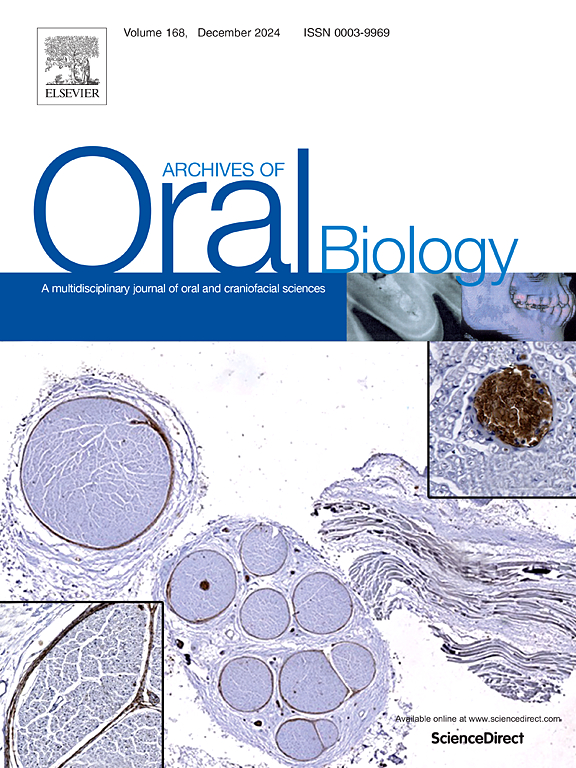Probiotic supplementation attenuates dental pain and inhibits pain-induced cognitive impairment in male rats
IF 2.1
4区 医学
Q2 DENTISTRY, ORAL SURGERY & MEDICINE
引用次数: 0
Abstract
Objectives
The gut-brain axis has emerged as a promising avenue for understanding the bidirectional communication between the gut microbiota and the central nervous system. This study investigated the potential impact of probiotics, Lactobacillus acidophilus (LA-5), Lactobacillus paracasei (L. casei 431), and Bifidobacterium lactis (BB-12), as well as their combination, on dental pulp pain management and cognitive functions.
Design
Forty-eight male Wistar rats were randomly assigned to six experimental groups (n = 8). The probiotics (109 CFU) were orally administered for 14 consecutive days. Capsaicin (100 µg) was used to induce inflammatory pulp nociception. The Morris water maze task was used to evaluate learning and memory performance. Levels of the interleukin-1 beta (IL-1β) and tumour necrosis factor-alpha (TNF-α) cytokines in the animals' trigeminal ganglion (TG) and the brain-derived neurotrophic factor (BDNF), neuropeptide Y (NPY), tropomyosin receptor kinase B (Trk-B) and Cyclooxygenase-2 (COX-2) genes in the animals' hippocampus were determined using western blotting and RT-PCR, respectively.
Results
Intradental application of capsaicin induced nociceptive behavior and increased IL-1β and TNF-α in the TG of rats. Probiotics could attenuate nociception and prevent IL-1β and TNF-α overexpression. Furthermore, pain induced cognitive impairments, decreased BDNF, NPY, and Trk-B and increased COX-2 gene expression in rat hippocampus, which were inhibited by probiotics supplementation.
Conclusions
Our findings suggest that probiotics may play a role in orofacial pain relief and cognitive enhancement in painful situations by modulating gut microbiota composition and influencing protein levels and gene expression in brain regions associated with pain and cognition.
补充益生菌可减轻雄性大鼠牙痛并抑制疼痛引起的认知障碍
目的肠脑轴已成为理解肠道微生物群和中枢神经系统之间双向交流的一个有希望的途径。本研究探讨了益生菌、嗜酸乳杆菌(LA-5)、副干酪乳杆菌(L. casei 431)和乳酸双歧杆菌(BB-12)及其组合对牙髓疼痛管理和认知功能的潜在影响。48只雄性Wistar大鼠随机分为6个实验组(n = 8)。益生菌(109 CFU)连续口服14天。辣椒素(100 µg)诱导炎症性牙髓痛觉。Morris水迷宫任务用于评估学习和记忆表现。采用western blotting和RT-PCR分别检测动物三叉神经节(TG)中白细胞介素-1β (IL-1β)和肿瘤坏死因子-α (TNF-α)细胞因子水平和海马中脑源性神经营养因子(BDNF)、神经肽Y (NPY)、原肌球蛋白受体激酶B (Trk-B)和环氧化酶-2 (COX-2)基因水平。结果传统应用辣椒素可诱导大鼠的伤害性行为,提高大鼠TG中IL-1β和TNF-α水平。益生菌可减轻痛觉,防止IL-1β和TNF-α过表达。此外,补充益生菌可以抑制疼痛引起的认知障碍,降低大鼠海马中BDNF、NPY和Trk-B以及增加COX-2基因表达。结论益生菌可能通过调节肠道菌群组成,影响疼痛和认知相关脑区蛋白水平和基因表达,在疼痛情境下起到缓解口面部疼痛和增强认知的作用。
本文章由计算机程序翻译,如有差异,请以英文原文为准。
求助全文
约1分钟内获得全文
求助全文
来源期刊

Archives of oral biology
医学-牙科与口腔外科
CiteScore
5.10
自引率
3.30%
发文量
177
审稿时长
26 days
期刊介绍:
Archives of Oral Biology is an international journal which aims to publish papers of the highest scientific quality in the oral and craniofacial sciences. The journal is particularly interested in research which advances knowledge in the mechanisms of craniofacial development and disease, including:
Cell and molecular biology
Molecular genetics
Immunology
Pathogenesis
Cellular microbiology
Embryology
Syndromology
Forensic dentistry
 求助内容:
求助内容: 应助结果提醒方式:
应助结果提醒方式:


